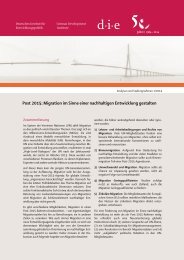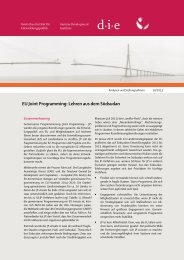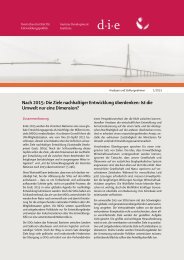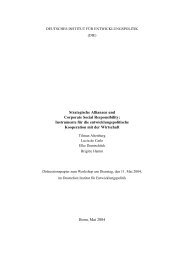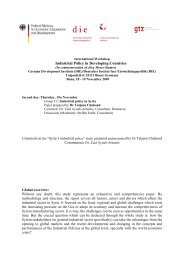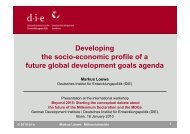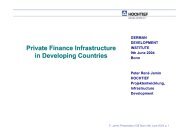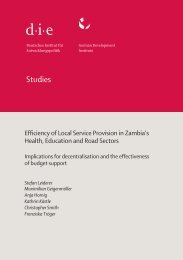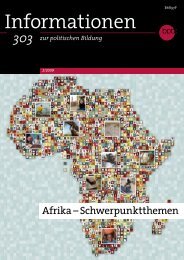Middle East / North Africa and the Millennium Development Goals ...
Middle East / North Africa and the Millennium Development Goals ...
Middle East / North Africa and the Millennium Development Goals ...
Create successful ePaper yourself
Turn your PDF publications into a flip-book with our unique Google optimized e-Paper software.
104<br />
Markus Loewe<br />
– Are <strong>the</strong> goals reflected in national development plans <strong>and</strong> have <strong>the</strong>y<br />
had any influence on <strong>the</strong> actual orientation of policy?<br />
There is some evidence indicating that most rulers in <strong>the</strong> MENA region<br />
are not especially committed to implementing <strong>the</strong> MDGs.<br />
It is, however, not possible to answer <strong>the</strong>se questions with any degree of<br />
certainty for lack of sound evidence. Official documents <strong>and</strong> communiqués<br />
are not particularly reliable in that <strong>the</strong>y do not necessarily reflect<br />
<strong>the</strong> actual opinions <strong>and</strong> intentions of those responsible for <strong>the</strong>m. They may<br />
be bound up with strategic goals. They are often addressed to specific circles<br />
– e.g. populations or constituencies, certain interest groups within a<br />
given country – or to <strong>the</strong> international community. In <strong>the</strong>se cases <strong>the</strong>y<br />
serve to boost <strong>the</strong> internal or external legitimacy of individual governments,<br />
i.e. <strong>the</strong>ir intention is to cast government policy in a favorable light<br />
among <strong>the</strong> populace or to curry favor among external donors (or both at<br />
<strong>the</strong> same time).<br />
Even proven facts are not necessarily hard evidence. One indication that<br />
<strong>the</strong> MDGs have met with acceptance might e.g. be that a demonstrable<br />
change of political course has taken place in favor of social <strong>and</strong> ecologically<br />
compatible development or that trends for certain MDG indicators<br />
have accelerated significantly since <strong>the</strong> <strong>Millennium</strong> Declaration. In itself,<br />
however, this is not solid evidence for any acceptance of <strong>the</strong> MDGs or<br />
commitment on <strong>the</strong> part of political decision-makers to implementing<br />
<strong>the</strong>m. Nei<strong>the</strong>r changes of political course nor social or environmental progress<br />
need necessarily be due to <strong>the</strong> <strong>Millennium</strong> Declaration. Such progress<br />
might have come about even in <strong>the</strong> absence of <strong>the</strong> declaration – <strong>and</strong><br />
been triggered by quite different factors. A country may e.g. have reached<br />
a certain phase of development at which its social <strong>and</strong> economic indicators<br />
improve for reasons that have little to do with politics, or it may be reaping<br />
a harvest sown in earlier decades.<br />
4.1 Level of awareness <strong>and</strong> acceptance of <strong>the</strong> MDG<br />
agenda<br />
Formally, all countries of <strong>the</strong> MENA region have accepted <strong>the</strong> MDGs. Indeed,<br />
<strong>the</strong>y <strong>the</strong>mselves have set <strong>the</strong> goals, toge<strong>the</strong>r with all o<strong>the</strong>r UN member<br />
states, at <strong>the</strong> <strong>Millennium</strong> Summit in New York.<br />
German <strong>Development</strong> Institute



